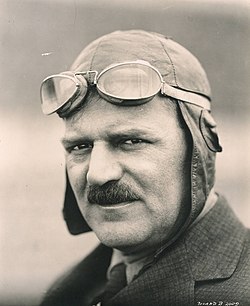Louis Chevrolet
| Louis Chevrolet | |
 | |
| Född | 25 december 1878[1][2][3] La Chaux-de-Fonds[4], Schweiz |
|---|---|
| Död | 6 juni 1941[1][2][3] (62 år) Detroit, USA |
| Begravd | Holy Cross and Saint Joseph Cemetery[5] |
| Medborgare i | Schweiz och USA |
| Sysselsättning | Entreprenör, racerbilförare, ingenjör |
| Befattning | |
| Medgrundare, Chevrolet | |
| Släktingar | Gaston Chevrolet (syskon) |
| Utmärkelser | |
| Motorsports Hall of Fame of America | |
| Redigera Wikidata | |

Louis Chevrolet, född 25 december 1878 i La Chaux-de-Fonds i Schweiz, död 6 juni 1941 i Detroit, Michigan, var en amerikansk racerförare och grundare av bilmärket Chevrolet. Närmare 100 miljoner bilar med det namnet har tillverkats.
Biografi
Louis Chevrolet var son till en urmakare och hade fem bröder. 1886 flyttade familjen till Beaune i Frankrike, men kring sekelskiftet reste han tillsammans med två av sina bröder till Amerika. Egentligen skulle de sälja en hembyggd vinpump, men brödernas intresse fokuserades snart på den blomstrande bilindustrin.
Louis Chevrolet fick anställning vid Fiats racingstall, och inledde snart en framgångsrik karriär som racerförare. 1905 utsågs han till Amerikas snabbaste förare, men vann inte det första Indycarmästerskapet, som gick till Barney Oldfield. Chevrolet fick däremot äran att vinna mästerskapets första tävling någonsin. General Motors grundare William Durant fick upp ögonen för den unge fartfantomen, och noterade även att han var en lovande designer och konstruktör. Ett samarbete inleddes, och i mars 1911 provkördes den första av fyra prototypbilar. Den sexcylindriga sportbilen, som kallades Chevrolet Classic Six blev en omedelbar succé, och under premiäråret 1912 såldes 3 000 exemplar. Samarbetet varade dock inte länge. Chevrolet ville satsa på exklusiva sportbilar, Durant ville konkurrera med de billiga T-Fordarna. 1914 lämnade Louis Chevrolet företaget, utan att få varken varumärke eller pengar med sig.
Efter att ha lämnat General Motors startade han tillsammans med brodern Arthur ett nytt företag, som bland annat tillverkade motordelar. Ett samarbete med Stutz inleddes också, men detta företag havererade när den stora depressionen kom.
Louis Chevrolet dog utfattig och ligger begravd i Indianapolis i USA. Han blev för sina insatser invald i International Motorsports Hall of Fame 1992.
Referenser
- ^ [a b] SNAC, Louis Chevrolet, läs online, läst: 9 oktober 2017.[källa från Wikidata]
- ^ [a b] Find a Grave, 1904, Louis Chevrolet, läs online, läst: 9 oktober 2017.[källa från Wikidata]
- ^ [a b] Brockhaus Enzyklopädie, Louis Joseph Chevrolet, läst: 9 oktober 2017.[källa från Wikidata]
- ^ Gemeinsame Normdatei, läst: 14 december 2014, licens: CC0.[källa från Wikidata]
- ^ Find a Grave, 1904, läs online, läst: 22 juni 2023.[källa från Wikidata]
Externa länkar
- Louis Chevrolets grav på Find A Grave (engelska)
Media som används på denna webbplats
Informal portrait of an intense Louis Chevrolet. He was in Tacoma to race in the July 4, 1919, races held at the Tacoma Speedway. He was the overall winner that day, winning two of the three events. Chevrolet, one of the best known names in automobile history, first belonged to this mechanical genius Louis Chevrolet. Born in Switzerland on Christmas Day, 1878, the son of a watchmaker, Chevrolet enjoyed taking things apart to see how they worked, but not sitting in a classroom. He left school early to become a bicycle mechanic and later a racer of bicycles. Once he discovered automobiles, there was no turning back. He left his home in 1900, at the age of 21, for North America. He began racing in 1905 and by 1907 had caught the attention of W.C. Durant, the father of General Motors, who hired him to design and race for his Buick racing team. Chevrolet was the head of a racing family of three brothers, the other two being Gaston and Arthur. Louis is credited with 27 major event racing wins in his career. In 1911, Durant traded on the fame of the Chevrolet name to form Chevrolet Motors, competing with Ford in the moderate price market, with Louis Chevrolet as head designer. Chevrolet soon left due to artistic differences and formed his own company, Frontenac Motors. After the financial failure of Frontenac, he designed race cars for Monroe Motor Co., designing the Indy 500 winner in both 1920 and 21. After cars, he branched out into airplane design without great business success. He died in 1941, at the age of 63, having never achieved the financial success that he deserved. His fame lives on in the Chevrolet automobile name. G52.1-031; TPL-3173


